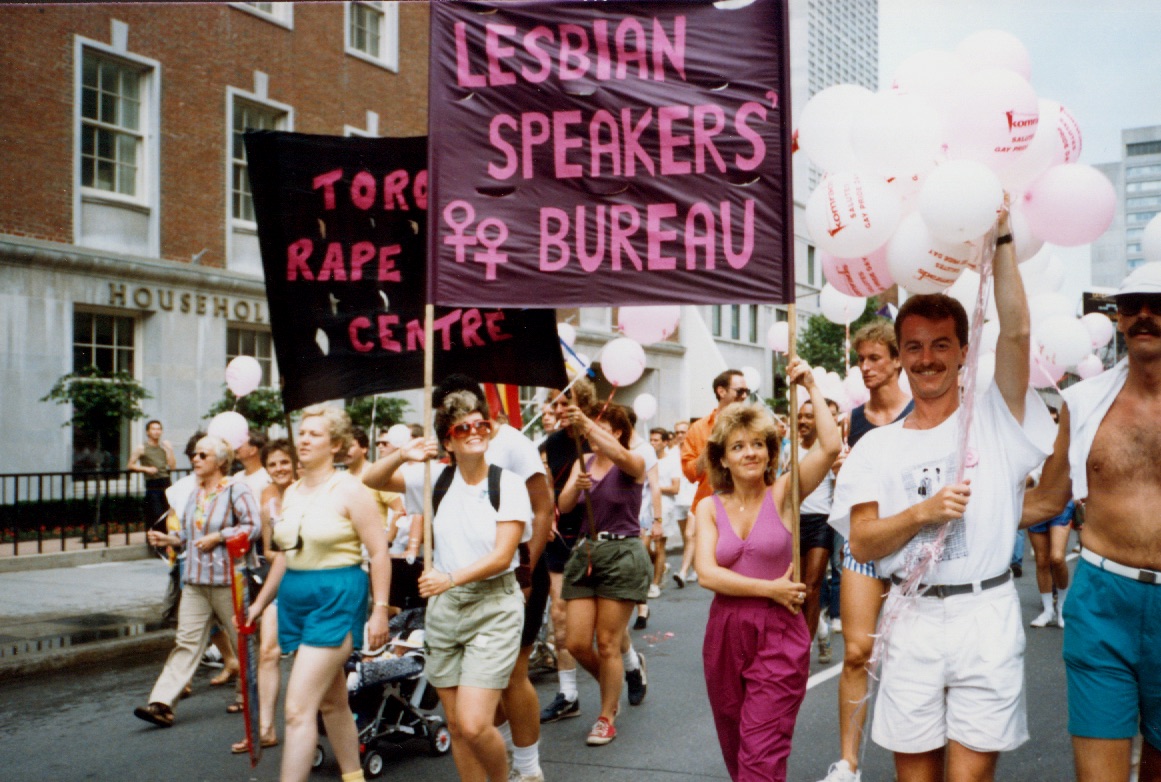Yvette Perreault remembers feeling hopeless and ignored as an HIV/AIDS worker in Toronto in the 1980s and 1990s, during the epidemic that would claim thousands of lives. Her gay male friends and acquaintances were dying while the life-saving drugs were not yet allowed in Canada and had to be smuggled in.“I remember standing up in some public health meetings asking where are the old polio nurses, the old TB nurses? We’re not the first people to deal with a health epidemic,” recalled Perreault. One day at work at the AIDS Committee of Toronto, a colleague put together a tally: nearly 200 clients of theirs died over a year. “That’s more than one every two days, no wonder I don’t remember whose funeral I’m at,” she remembered thinking at the time.
Perreault and her team were overcome with grief and pain, so she decided to take control by bringing in a therapist who had worked with Vietnam war veterans, who held a number of sessions over several weeks. “That was the first group where I thought I’m not crazy, I’m having a normal response at an abnormal time,” she said.And now, decades later, Perreault is working with Toronto’s harm reduction community to help them cope and build resilience amid a worsening opioid overdose crisis that bears striking similarities to what she and many others experienced during the height of the HIV/AIDS crisis. Federal health minister Jane Philpott warned in May that the opioid-related death toll has surpassed HIV/AIDS deaths, and any other infectious epidemic in the nation’s recent history.Zoe Dodd has been working with drug users for years in her role as the Hepatitis C coordinator at Toronto’s South Riverdale Community Health Centre. Her line of work has always been chronically underfunded and the solutions she and the community say they need are largely ignored by policymakers. But in recent months as opioid overdoses have skyrocketed, she and her colleagues are burning out and taking on more anxiety than ever before. Just this weekend, at least four people died of overdoses and dozens more had to be revived with the antidote naloxone. The drug supply has become so tainted that in some cases, users have to be revived with multiple doses.This is all compounded by the fact that those who are overdosing are more than clients — they’re close friends who also work in harm reduction. The community is hosting regular memorials to mark the lost lives.
But in recent months as opioid overdoses have skyrocketed, she and her colleagues are burning out and taking on more anxiety than ever before. Just this weekend, at least four people died of overdoses and dozens more had to be revived with the antidote naloxone. The drug supply has become so tainted that in some cases, users have to be revived with multiple doses.This is all compounded by the fact that those who are overdosing are more than clients — they’re close friends who also work in harm reduction. The community is hosting regular memorials to mark the lost lives. “It’s crushing people,” said Dodd. “It’s constant grief and loss and trying to sort out how to take care of yourself, but you don’t even have time to grieve the last death before the next death.” One of her co-workers lost five people in a month. “And there’s no mental health support for that,” she said. “There are so many people who are reversing so many overdoses that it can be quite traumatizing.”That’s why Dodd has taken it upon herself to form monthly support group meetings for workers like herself to come together and have frank discussions about what’s going on and how they can move forward. This includes gatherings facilitated by Perreault, who co-founded the AIDS Bereavement and Resiliency Program of Ontario and serves as a program director. Through that group, she offers workshops and specific techniques for those dealing with loss and death in the workplace.“It’s cool we have elders in the HIV community who have really stepped up,” Dodd said. “Sharing with us, and trying to keep us steady.”Perreault said she’s in the beginning stages of launching a pilot project with harm reduction workers, and is offering to help get more resources and formal programming in place.
“It’s crushing people,” said Dodd. “It’s constant grief and loss and trying to sort out how to take care of yourself, but you don’t even have time to grieve the last death before the next death.” One of her co-workers lost five people in a month. “And there’s no mental health support for that,” she said. “There are so many people who are reversing so many overdoses that it can be quite traumatizing.”That’s why Dodd has taken it upon herself to form monthly support group meetings for workers like herself to come together and have frank discussions about what’s going on and how they can move forward. This includes gatherings facilitated by Perreault, who co-founded the AIDS Bereavement and Resiliency Program of Ontario and serves as a program director. Through that group, she offers workshops and specific techniques for those dealing with loss and death in the workplace.“It’s cool we have elders in the HIV community who have really stepped up,” Dodd said. “Sharing with us, and trying to keep us steady.”Perreault said she’s in the beginning stages of launching a pilot project with harm reduction workers, and is offering to help get more resources and formal programming in place.
Advertisement

At a recent vigil held earlier this month at South Riverdale, Dodd and dozens of other mourners gathered to remember prominent harm reduction advocate Raffi Balian, who died of an overdose in Vancouver where he was attending a meeting on supervised consumption sites. It was, for many, a harsh reminder of the relentless crisis that’s taking even the most experienced drug users.“We have elders in the HIV community who have really stepped up,”
Advertisement

“We were just in Ottawa last week because one of the peers there died, and right now what we’re saying is we will take the resources of the AIDS Bereavement and Resiliency program and spread them out to the harm reduction community as best we can,” she explained. “We don’t have a structured response yet — but we’re in. We will find you a way to get you resources to help you.”When it comes to her work now on HIV/AIDS, Perreault says that things have generally shifted from coping with deaths from the illness itself, and more towards supporting people who are living with it long-term. And there’s a strong infrastructure in place to help those people and their loved ones during times of struggle and loss.“We don’t have a structured response yet — but we’re in. We will find you a way to get you resources to help you.”
“That’s the difference from when I was a youngster in the field thinking it was all my personal responsibility, that it was my job to sort this out … a lot of luggage to carry as a young activist,” she said.But in order for the same, constant supports to exist for those affected by the overdose crisis, there has to be funding, she said. “If they can fund this for AIDS workers … they can find the resources in the harm reduction world or [from the province] to take care of these workers and the peers,” she said. “And those of us who know what this pain feels like have an obligation to step up and say you’re not alone here.”